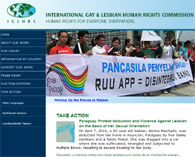On June 3, 2010, the UN Committee on Non Governmental Organizations (NGO Committee), which reviews applications from non governmental organizations for consultative status to the United Nations Economic and Social Council (ECOSOC), voted to block any action in this session on the application of the International Gay and Lesbian Human Rights Commission (IGLHRC), which was first submitted for consideration by the NGO Committee three years ago. The United States of America called for immediate action to be taken on the merits of IGLHRC's application, stating that IGLHRC had responded to numerous rounds of questioning since it had first submitted its application in 2008.

In response, Egypt called for a motion of no-action on that vote, arguing wryly that IGLHRC's answers to its questions were not sufficiently "straight."
Representatives of Romania and the United Kingdom of Great Britain and Northern Ireland spoke against the no-action motion, noting that a call for a vote on IGLHRC's application after three years of consideration was not "hasty" or "sudden," and that further questions would be a stalling tactic by States pushing a political agenda.
"The UK deeply regrets that the committee has to go through this motion and thus signalling that it does not recognise the work carried out by the International Gay and Lesbian Human Rights Commission," stated the representative from the United Kingdom. "We regret that we cannot reach consensus on the application but we know from the past that their further responses will never satisfy certain delegations."
The no-action motion carried, preventing IGLHRC's application from proceeding.
Though no explanation for the votes was required, several states — including Romania, the United Kingdom, US, and Colombia — chose to make statements denouncing the results of the vote as discriminatory on the basis of sexual orientation and gender identity, or as an abuse of procedure for discriminatory ends.
The United Kingdom stated that, "This act of simple discrimination runs contrary to the principles of the UN, of ECOSOC and of the NGO Committee. It serves to do nothing more than reinforce the view that this Committee can not be trusted to undertake properly the work with which it is tasked. Chair, My delegation will continue to argue for the full inclusion and involvement of NGOs representing the gay and lesbian community in the work of the UN. Simply put, it is their right."
The representative from Qatar conversely argued that it was "merciful" of the States to postpone action, rather than close the application outright.
Many observer states, including Australia (representing Australia, Canada, and New Zealand), Chile, Switzerland, and Spain (representing the European Union), also denounced the results of the vote. Spain, on behalf of the European Union, stressed that discrimination in any form, including that based on sexual orientation and gender identity, ran counter to the spirit of general debate within the United Nations.
Votes on the no-action motion:
No (6):
Colombia, Israel, Peru, Romania, United Kingdom of Britain and Northern Ireland, United States of America
Yes (10):
Angola, Burundi, China, Cuba, Egypt, Guinea, Pakistan, Qatar, Russia, Sudan
Abstention (2):
India, Turkey
Absent/No Vote (1):
Dominica
